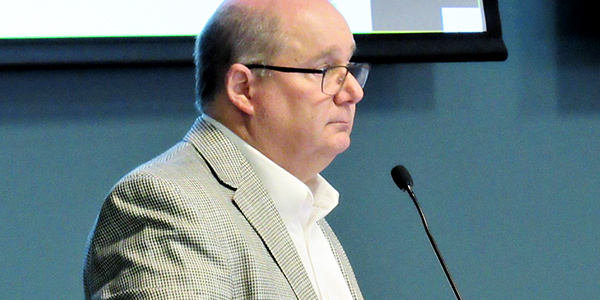CARMEL, Ind. — MISO is moving ahead with a proposal to bring solar generation into market dispatch, reusing many of the rules from its 2011 change that brought dispatchable wind generation into the markets.
At the Market Subcommittee meeting Tuesday, Executive Director of Market Operations Shawn McFarlane said MISO will file the Tariff changes later this month.
The proposal would require solar plants to register under the dispatchable intermittent resources category, the same category MISO requires of its wind generation. Officials said the change is driven by the rapid increase of solar installation in the RTO’s footprint. (See Anticipating Boom, MISO Extending Dispatch to Solar.)
Some stakeholders last month asked for grandfathered provisions from the change for existing solar generation, but MISO Manager of Resource Retirement Kun Zhu said no grandfather provisions were laid out in the RTO’s wind dispatch rules, nor SPP’s similar rules for solar dispatch.
Restoration Energy Design Nears Completion
MISO said its stakeholders are supportive of its plan to price energy that reactivates islanded areas of the grid following a blackout.
The RTO plans to make a Tariff a filing to incorporate the new pricing structure in either March or April.
MISO’s proposal dictates that compensation for restoration energy would rely on last-submitted offers before the blackout as a starting point for pricing, resulting in unique costs based on resource. The RTO would allow for the recovery of start-up costs, emergency purchases and resource-specific energy costs. It would also include recovery for any unusual costs incurred during operation, provided they can be verified by the Independent Market Monitor. It would also accept after-the-fact updates of offers. (See “Restoration Energy Pricing in the Works,” MISO Market Subcommittee Briefs: Oct. 10, 2019.)
Costs of restoration energy — including both resource costs and emergency energy purchases — would be allocated on an hourly load-ratio share to re-energized load in an islanded area. The restoration events would be considered finished when MISO’s day-ahead market again takes over economic dispatch.
Michael Chiasson, vice president of Potomac Economics, MISO’s Monitor, said the cost determination might not be neat and orderly, as islanded areas might shrink, grow or meld into one another as the restoration develops.
Chris Delk, MISO manager of market settlements, said the RTO would limit non-typical start-up costs, with a cap proposed at 50% of a unit’s cold start-up costs, the most expensive category. He said MISO and the Monitor were concerned about how high supplementary start-up costs could go absent a cap. The atypical costs might include the costs of renting hotel rooms for employees, travel or transportation, he said. Recovery of anything beyond the 50% cap on additional start-up costs would require a filing with FERC.
“We want it to go before FERC to get it on the record and get them defending it publicly,” Delk explained to stakeholders.
New MISO Market Protections Inevitable
MISO will seek FERC approval next month for authority to increase collateral requirements and suspend trading when a market participant exhibits undue risk to its markets.
The RTO will request an effective date before April for the changes to its credit policy.
MISO’s proposed Tariff language would allow it to act when it perceives evidence of default, manipulation or unreasonable risk to the markets. The new rules would also allow it to reject applications from new market participants and former market participants that have an uncured financial default and attempt to rejoin the RTO under a different name. Finally, MISO would ask prospective and current market participants for more specifics on its annual certification form. It would inquire about any past defaults, bankruptcies, dissolutions, mergers or acquisitions, and any investigations.
The broader market protections edits are an expansion on stepped-up requirements in MISO’s financial transmission rights market. The RTO on Nov. 22 received FERC permission to apply higher collateral requirements (ER20-73). (See MISO Looks Beyond FTRs for Market Protections.)
Customized Energy Solutions’ David Sapper asked if MISO will rely only on publicly available information to make decisions about risk to the market.
“Probably not,” said Brian Brown, principal credit analyst for the RTO. “If there’s risk to the market, we don’t want to put our head in the sand and ignore it.”
Brown also pointed out that the Tariff already requires market participants to notify the RTO of confidential investigations, so it should already be privy to certain nonpublic information.
— Amanda Durish Cook





